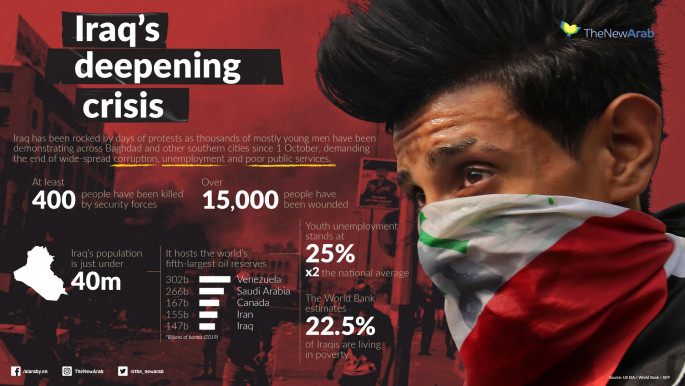Six killed, scores injured as Iraqi security forces suppress protests
Four of the protesters were killed in the capital Baghdad, while one was killed in the Shia-Muslim holy city of Karbala. Another was killed by unknown militants in the southern city of Basra.
A photojournalist named Youssef Sattar was among the dead and a medical source told The New Arab’s Arabic-language service that a 16-year-old boy died in hospital on Tuesday morning due to wounds sustained at a protest. Nine other protesters were in a critical condition.
The source was speaking anonymously due to Iraqi employees from the ministry of health being prohibited from providing media with an updated death toll from the protests. The ministry of health used to provide journalists with regular updates of casualties.
Twitter Post
|
Activists shared horrific images of Twitter of a protester's shattered skull, who was shot dead by security forces on Mohammed al-Qassem Street in south Baghdad.
Deadly tear gas grenades have also inflicted gruesome injuries on protesters in previous protests.
Despite this, protesters returned to the streets of Baghdad and other cities in southern and central Iraq on Tuesday morning. Some roads were blocked and government offices were closed. Security forces were also deployed in large numbers.
Protests in Iraq began in October last year in response to government corruption and high rates of poverty and unemployment.
The protesters are calling for an end to government "procrastination" in meeting their demands.
Iraqi security forces have responded violently to the protests, killing around 460 people and injuring more than 25,000.
Read more: Iraq’s Lost Generation
"The procrastination of the government and the political class for more than three months now has prompted us to take escalatory steps to pressure them to meet our demands," Mohammad Faeq, a 28-year-old protester, told AFP.
News of the protests has taken a back seat recently, following the killing of Iranian commander Qasem Soleimani in a US airstrike.
The protesters have also decried Iranian influence in Iraq and pro-Iran militias have also been involved in the killing of protesters.
The Iraqi High Commission for Human Rights (IHCHR) called on the government to protect peaceful demonstrators after Monday's deadly violence.
"Unfortunately, instead of the government meeting the protesters’ demands, they have responded to them again with violence in Baghdad and the other provinces," Ali Bayati, an official from the IHCHR, said.
Bayati said many protesters were arbitrarily detained without warrants for their arrest on Monday.
The official spokesman for the commander of the Iraqi armed forces, Abdul Karim Khalaf alleged that protesters who had "blocked roads and prevented students and employees from going to work".




